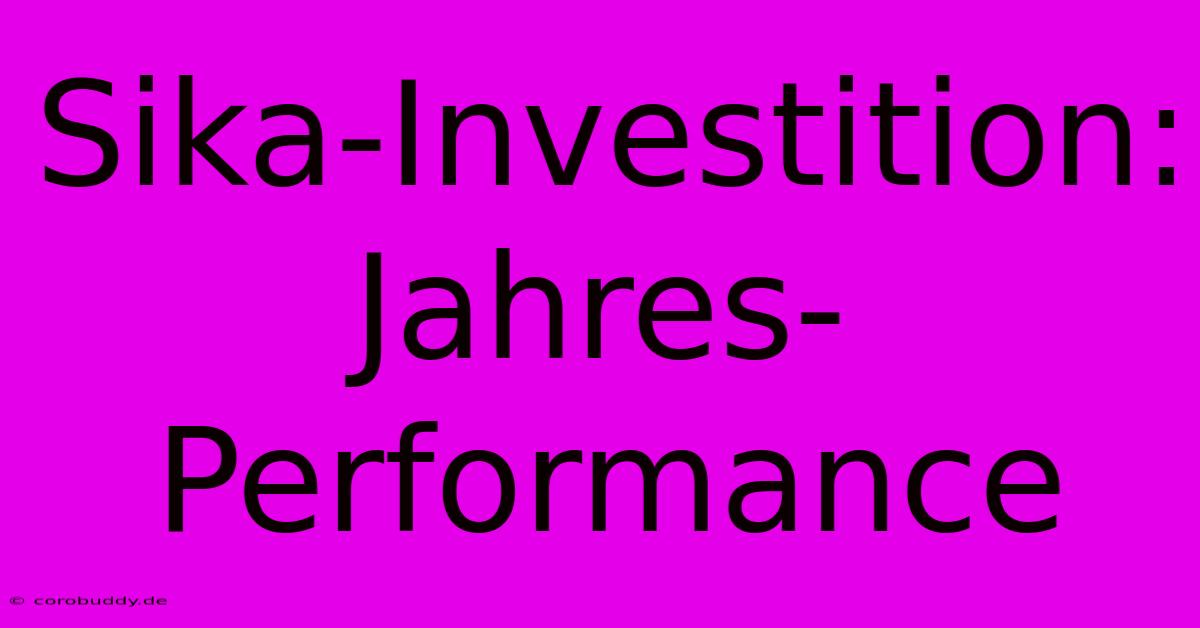Sika-Investition: Jahres-Performance

Discover more detailed and exciting information on our website. Click the link below to start your adventure: Visit Best Website Sika-Investition: Jahres-Performance. Don't miss out!
Table of Contents
Sika-Investition: Jahres-Performance – Meine Erfahrungen und Tipps
Hey Leute! Let's talk about Sika. Specifically, Sika-Investition: Jahres-Performance. Investing in the stock market can be a rollercoaster, right? I’ve definitely had my ups and downs with Sika, and I want to share my experience – the good, the bad, and the ugly – to help you navigate your own investment journey.
I remember when I first bought Sika stock. It was a few years back, and I'd done, like, zero research. Yeah, I know, total rookie mistake! I’d heard it was a "solid" company, making stuff for construction, and thought, "Easy money!" Boy, was I wrong. I practically threw money at it, didn't think about diversification, nothing. My initial investment was based purely on hype – a big, fat red flag I learned to avoid later on. This resulted in a pretty disappointing first year's performance.
<h3>Learning from Mistakes: Diversification and Research are Key</h3>
My early Sika experience taught me a valuable lesson: diversification is your best friend. Don't put all your eggs in one basket, people! Spread your investments across different sectors and companies to mitigate risk. If one stock tanks (like mine almost did!), you're not completely wiped out.
Secondly, thorough research is essential. I know, it's boring, but reading up on company financials, understanding their business model, and looking at industry trends is crucial before investing. It's time-consuming, yes, but far less painful than losing money due to impulsivity. I wish I'd used tools like Google Finance or Yahoo Finance to track Sika's performance before making my move.
<h3>Analyzing Sika's Annual Performance: What to Look For</h3>
Looking back, I should have paid closer attention to Sika’s annual reports. These reports are goldmines of information on a company's financial health. Key metrics to analyze include:
- Revenue Growth: Is Sika's revenue increasing year-over-year? Steady growth signals a healthy company.
- Profitability: Are they profitable? What's their profit margin? Are profits increasing or decreasing?
- Debt Levels: High debt can be risky. Check their debt-to-equity ratio.
- Market Share: Is Sika gaining or losing market share in its industry?
- Future Outlook: What are the company’s growth prospects?
I've since become a much more disciplined investor. I analyze the financial statements of any company I'm thinking about investing in. Also, I look at their ESG (Environmental, Social, and Governance) factors. Investors are increasingly considering these factors, and a company with strong ESG performance often has better long-term prospects. Not everyone agrees on this point but it's becoming more mainstream.
<h3>Long-Term Perspective is Crucial</h3>
Remember, investing isn't a get-rich-quick scheme. It's a long-term game. You won’t see consistent results every single year; there will be ups and downs. My initial disappointment with Sika's performance taught me patience and the importance of a long-term investment strategy. You have to ride out the dips and trust in your research.
Disclaimer: I am not a financial advisor. This is my personal experience and should not be considered financial advice. Always do your own research and consult with a financial professional before making any investment decisions.
So, that's my story with Sika. What are your experiences? Let's discuss in the comments below! What factors do you consider when evaluating a company's yearly performance? Share your tips and tricks – we can all learn from each other!

Thank you for visiting our website wich cover about Sika-Investition: Jahres-Performance. We hope the information provided has been useful to you. Feel free to contact us if you have any questions or need further assistance. See you next time and dont miss to bookmark.
Featured Posts
-
Sika Aktie Im Minus News
Nov 22, 2024
-
Ballermann Ranch Rettet Esel
Nov 22, 2024
-
Sion 2025 Sternenprogramm Enthuellt
Nov 22, 2024
-
Thyssenkrupp Nucera Kursgewinn 8 66 E
Nov 22, 2024
-
Saugroboter Q5 Max 399 E Jetzt Kaufen
Nov 22, 2024
